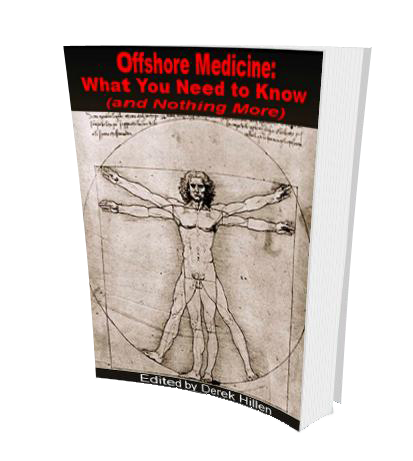- Boat
- Articles
- About
- Tehani-li Logs
- 2004
- Uligan Maldives
- Man, Oh Man, Oman
- Eritrea: The Nicest Place You’ve Never Heard Of
- Cruising Notes: Oman to Eritrea – From Pirates to Cappucinos
- Old Testament Sudan
- Egypt: Legend, Myth and Reality
- Thoughts on Cruising the Red Sea
- Greece: Civilization Again
- Montenegro
- Malta
- Sardinia, Italy
- Barcelona, Spain
- 2003
- 2002
- 2001
- 2004
- Contact
Montenegro
After crossing Greece we turned north and headed into the Adriatic Sea for a little-visited country called Montenegro. Officially known as “Serbia-Montenegro,” Montenegro is the coastline portion of that unhappy marriage and sits between Croatia and Albania. We went there to visit good friends of ours Derek knew from New York days, Greg and Miki Mitrovich. Greg and Miki have family there and return every summer to “the old country.”
Nine years ago, long before I met Ariel and before I even knew how to sail, I told Greg and Miki about my plans to buy a boat and sail around the world. From the beginning they offered stalwart support to what others might think were the ravings of a madman wandering the dark streets of Manhattan.
After I bought Galileo, my first boat (see “The Galileo Logs”) they used to come sailing with me in the summers on Long Island Sound – once I knew what I was doing, that is! (Greg points out they even came sailing with me before that!). Anyway, they made me promise that if I ever made it to the Mediterranean I would come visit the family in Montenegro.
Little did I expect it would actually happen and certainly not on a different boat and with my wife in tow at that. So it was nice to keep a promise made so long ago. What follows are some of our adventures there during a two week stay. To say we were pampered by Miki’s family, the Niklanovics (pronounced “Niklanovich”) would be a serious understatement. They took us in like family and Vlado and Nevenka, Miki’s parents, spoiled us rotten!
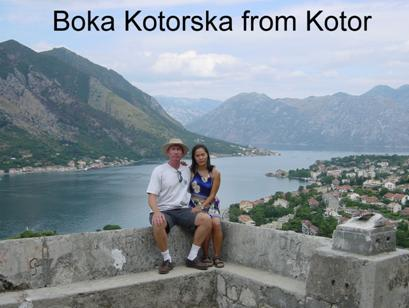
To get to Montenegro we did an overnighter from Erikoussa Island, a little speck 30 miles offshore of Corfu and our very last stop in Greece. Careful to avoid Albania, we tacked out toward Italy for 60 miles before heading north into the Adriatic to our check-in port of Bar, in Montenegro 150 miles away. Every summer thousands of boats go to Croatia and we have countless friends there now, and friends who have already been.
When you talk about the Adriatic you are talking about Croatia and its fabulous Dalmation coast of billions of islands and ancient walled cities like Dubrovnik. In fact, I just got an email from friends there now complaining that many of the anchorages are so crowded that you anchor ONE FOOT away from the next boat. As nice as Croatia must be that’s not for us. Nobody seems to go to Montenegro.
In fact I can tell you that nobody at all is going there and it is right next door. We were virtually the only cruising boat there and when we left we were told the local newspaper made us headline news; “Two American Sailors Visit Montenegro.” (!) That shows you how this place has been totally ignored. I think part of it has to do with the word “Serbia” and all the bad press that entails and the other is the steep check-in charges. More on the current reality of both follows.
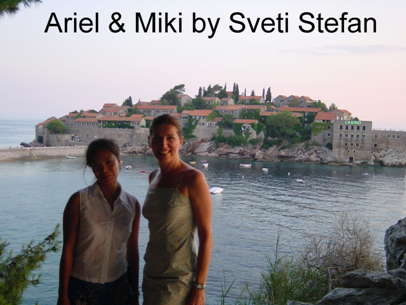
We motored into Bar at the very southern end of tiny Montenegro early Monday morning and tied up to the quay in the very big marina there. When turning to starboard and making your entry into the marina stay close to the breakwater as it gets shallow right away towards the beach.
Bar is an industrial port and is also the ferry terminus for the big ships coming from Italy. Check-in was confusing and turned into a comedy of errors that eventually worked out in our favor. Be aware that currently there are only three ports in the country you can check in or out of; Bar in the south, and Zelenika and Kotor in the north. Our experience with officials in Montenegro suggest there are two kinds; those that understand the TV show “Seinfeld” and those that don’t.
Basically, anyone over the age of 50 and in uniform is what they call a “pensioner” – a communist party hack holding on by his dirty fingernails through all the recent changes rushing around him just long enough to get his pension. He was brought up and trained to bark, “No,” to anything you want to say, do, or even think of doing.
Like communist officials all over the world I have had the pleasure of meeting from China, north, west, east and south and throughout Russia, these people are exasperating to deal with and generally a waste of space. If you want a close up and personal view of why Communism collapsed like a cheap soufflé, look no further.
Fortunately for all concerned, the new generation is keen to learn, keen to help and keen to make a difference. Our experience with these people (the under 50’s) was always smooth as silk and they couldn’t do enough to help you. They even smiled! This alone gave us hope for the future. Again, of that generation many speak a little English but for the older generation in uniform, forget it.
Back to Bar; I stepped off the boat as soon as we arrived about 9 AM and wandered into the big ferry terminal to find Customs, Immigration and Port Control as you would do on arrival to any new country. I first went to the little bookstore/refreshment stand and asked the woman there, “Excuse me, where is the Port Control?” She replied, “No. No post office.” “No,” I said, “PORT CONTROL? PORT AUTHORITY?” Nothing. “HARBORMASTER?” I asked. “NO post office.” Oh well, eventually a nice guy in his 20s came along and said, “I have been to Canada to visit my friend. I speak a little English. Let me show you.” And that is how it is.
I walked across a little park to the office of the Harbormaster and went inside. As he was busy, I had to wait in the hallway giving me time to look at everything; ashtrays everywhere, old furniture, and a few clocks hanging on the walls – none of which worked. No computers to be found, that’s for sure.
My turn came and I walked in and tried in simple English to explain I was an American sailor and would like to check in to the country, please. “No.” Right, I kind of expected that. I tried again and then the chain smoking Harbormaster ground his ciggie out in the ashtray, exhaled and wrote on a piece of paper “1600.” What? “You come back,” he said. “You want me to come back today at 4 PM?” I asked. He nodded. This was not on.
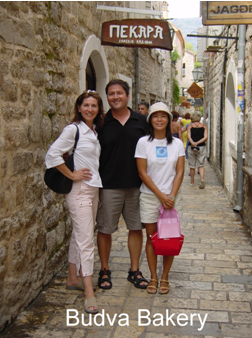
We wanted to check in at Bar and then motor the 15 miles up the coast to Budva where Greg and Miki and family were waiting for us. Not only that, judging from the broken clocks on the wall I doubted they would even know when “1600” rolled around. I persisted in my best friendly and dumb American tourist manner, “No, no. I would like check-in NOW, please?”
After a few times of this run around he held his hand up and said, “You wait.” He made a phone call (the phone was the only thing on his desk other than the rather full ashtray) and mumbled into the receiver in Serbian, hung up and lit another smoke. I sat there patiently with my hat in hand enjoying the stale smoky air.
Ten long minutes later the “Inspector” comes down and he speaks a little more English. I sense there is a problem here not of their own making but I am determined to get in and get out as fast as possible. He explains to me they have no more forms and are printing them!!! This is the first time we have run into that problem, I’ll admit.
But long hard experience with these things tells me it ain’t going to be any different at 4 PM either! I patiently explain we have come a long way to visit friends in Budva, a big family, and they are waiting for us. “Who iz family?” he asks. I tell him, “The Niklanovics.” “Niklanovic? You mean Krsto?” Krsto is Miki’s cousin and I had been told to get in touch with him when we arrive in Budva. “Yes! Yes! Krsto is my BEST FRIEND!” I almost shouted. OK, smiles all around. “Iz no problem. You go Budva and check Harbormaster there.” Wow, a breakthrough. We’re free.
But I know Budva (pronounced “Boodva”) is not an international port and I don’t want them telling me to turn around and go back to Bar to check in either. I ask these two officials their names, “Zoran” and “Mirko” and we are all old friends now. The only thing we have left to do in Bar is go to the police station at the ferry terminal and get them to stamp our passports. There is no immigration office there yet and this is Montenegro’s biggest port.
OK, off I happily go. When I get there I hand over my wife’s new passport and my passport which has several page extensions in it and is weathered and rather thick. I hand it to the weathered and rather thick policeman sitting behind a small steel desk. “Amerikan?” He asks, looking at them both dubiously. “Yes, that’s right,” I respond with a feeble smile. He looks at Ariel’s passport, seems OK, drops it on the table and then picks up mine, which I admit is about as fat as a small phone book.
“Iz no good,” he says flatly. WHAT? “Passport no good.” First time this has happened as well. Then a few other heavy set policemen wander in and grab the passports. Back and forth they go, passports snatched this way and that with an animated discussion of who knows what in Serbian.
I don’t understand a thing so again I patiently wait it out. Finally, a more senior cop says “OK.” And stamp, stamp we’re off to the races. I hop back on board, Ariel fires up the engine and two hours later, after following a beautiful wooded coastline with countless inviting beaches backed up by steep mountains, we arrive in mysterious “Boodva.”
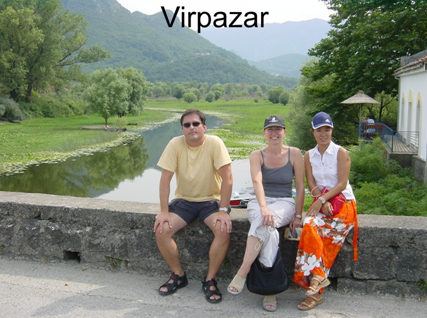
We tried anchoring off the marina in four meters in grass but Miki’s father, Vlado and cousin Zeljko, were already in a skiff and came out to greet us. They told us not to anchor there but to wait while they arranged a slip for us in the small marina at the edge of the old town.
They were able to negotiate a good price otherwise the marina would charge us 45 Euros ($55) a night! Ouch! While we were there the marina was pretty empty and only filled up with power boats on weekends. This is the other problem that Montenegro seems to have with yachting; they don’t understand that lower prices mean more customers. We were able to check in at Budva and it cost us $125 for a month.
A twelve month, multiple entry visa would have been $185. That came to almost a dollar per mile of coastline (it’s a small place) and is a rip-off. Croatia charges about the same thing but you can easily spend a year exploring their coast. It should be no surprise we were pretty much the only non-local sailboat in the marina the whole time we were there. For that price, however, there is water and power at the marina.
We were at the end next to the Lucka Kapitania’s boat, the port captain, and with no power. That didn’t matter much to us as we were glad to be there and Greg and Miki came down to whisk us away to Miki’s parent’s new house up in the hills overlooking the entire bay. Ariel and I adapted rather quickly to three gourmet home-cooked meals a day, air-con, washing machines, CNN and unlimited fresh water.
We were constantly fed, stuffed and pampered by Neva and Vlado, Miki’s parents, who had owned a very successful restaurant in the San Diego area for many years called the “Westside Cafe.” Of course, Vlado was suave and charming, and of course Neva was a five star chef who made sure we ate the equivalent of our own body weight every day.
It seems in Mediterranean culture, the phrase, “No, I’m full, really,” doesn’t exist. We had a great time and clearly loved being spoiled. Vlado and Neva were born and raised in Budva but spent 30 years in the US working their way up from the bottom while raising a family in California. They have now retired in style and returned to their roots where they built a beautiful new mansion on family property in the hills surrounded by olive trees and flowers with a million dollar view out over the bay to Sveti Stefan and Budva.
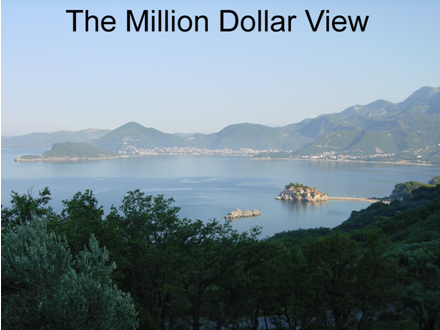
Montenegro uses the Euro even though they are not part of the EU. This allows them to avoid the hyperinflation that Serbia suffered during the war using the old dinar. Look at the picture of the Serbian note: that’s 500 MILLION dinars. Not too long ago in Belgrade, that and 50 cents would buy you a cup of coffee.
War and sanctions totally destroyed the national currency. Now the dinar seems to have recovered. Montenegro has been leaning towards independence for a while and there is a general apathy about it on the Serbian side. I find this hard to believe as if Montenegro, a tiny coast-hugging territory of 600,000 people, goes it alone Serbia loses its access to the Adriatic and the Med.
Plus, most of the tourism potential (the world’s largest industry) is to be found in Montenegro’s unspoiled beaches and medieval towns. Further distancing itself from Serbia, ten days before we arrived, Montenegro had just adopted a new flag, a red background with a double headed eagle (I guess the eagle is looking both east and west…).
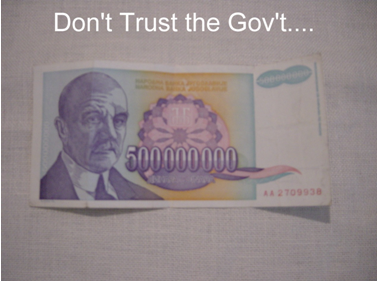
After settling in, I was keen to finally meet Krsto, Miki’s cousin and the reason we were allowed into the country in the first place. Krsto is a big man with a big heart and lucky for us owns the best restaurant in the entire country. “Jadran” is right on the waterfront and has huge honest portions of fantastic local fare with homemade sausages and homemade wine complementing their endless hospitality. Unfortunately, we were never allowed to pay.
In Serbian tradition, no distinction is made between “first cousins,” “second cousins” and others like “6th cousin three times removed.” Families are very tightly-knit and a cousin is regarded as immediate family, more like a brother or a sister. We were now “family” and were welcome wherever we went as the Niklanovic clan seem to own half the town and everyone went out of their way to be nice to us. Ariel didn’t want to eat at “Jadran” as she felt we would be taking advantage of their hospitality. I had to agree, but the food….. Anyway, whenever we ate there we left some money for the waiters at any rate.

Budva is the heart of the “Budva Riviera” and is very much a “see” and “be seen” kind of town, Serbian style. It used to be popular with western Europeans before the war but they all fled. Now, with the cessation of hostilities and Milosovic behind bars where he belongs, western tourists are just only slowly coming back.
Most of the tourists today are Serbs or others from the old Eastern block. Certainly, there were no Americans to be seen and it was a privilege to find it so “unspoiled,” as I know in a few years Montenegro will be chock a block with big Germans in small Speedos and topless older Swedes with higher prices to come.
One thing that struck us about the local people here was they are so damn tall. Everywhere we looked we saw people, strong and well-built towering over us. Unlike Greece, where I was easily taller than most, here I was six feet short. And another thing, they live forever.
Vlado, who talks, acts and moves like he is approaching 60, had his 80th birthday while we were there! And the hills are full of 90 year olds and 100 year olds stomping around. It must be the climate and the great food, I don’t know, but it would make an interesting study for geneticists to see how these people live so long and without access to modern medical care.
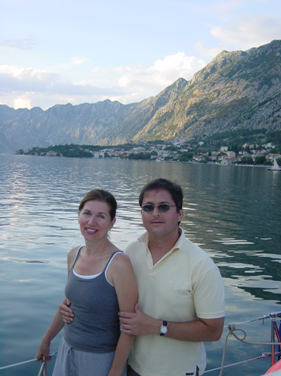
After living like kings for a week we took Greg and Miki “med-sailing” up the coast to explore some more of this interesting country. Although in the breakup of Yugoslavia, Croatia got all the islands on the coast, Montenegro did get a beautiful inland fjord area called, “Boka Kotorska.”
These are three large inland salt water lakes all connected together and lying at different angles nestled deep inside the mountains. Oh, and the mountains are everywhere. “Montenegro” means “Black Mountain” in Italian and they do take on that look with the afternoon cloud cover. (The Serbs call their country, “Crna Gora,” which means the same thing but is just too hard to pronounce).
On our day to set off we motored a couple hours up the coast with the wind on the nose (heard that before?) and passed between an island stone fort and some old stone shore batteries to enter this protected area. We spent our first night anchored off the beach town of Herceg-Novi (42 27.114 N 18 31.620 E) in 10 meters in a beautiful spot right under the town and off the beach.
Here we could swim from the boat and spent the evening wandering around this locals-only beach resort. Note; “Herceg-Novi” the town is different from “Bosnia-Hercegovina” the newly independent and landlocked country. The word “Herceg” comes from Austria (which used to rule the area) and means “Noble,” while “Novi,” as you can guess, means “New.”
The next day we decided to go all the way in to the end of this fjord/lake complex to an ancient walled city, Kotor. We cruised past dramatic mountain scenery with small stone towns hugging the shoreline and tall church spires of ancient abandoned hamlets poking through the lush green undergrowth high up in the hills. It felt like going back in time and discovering that fairy tale city where everyone was put asleep 100 years ago with vines and trees slowly taking over the whole scene.
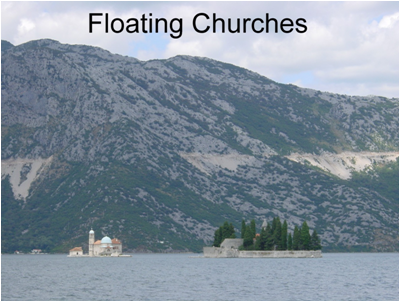
In the approach to Boka Kotorska are two tiny little islands sprouting churches. It looks like the churches are floating on the water and is an arresting sight.
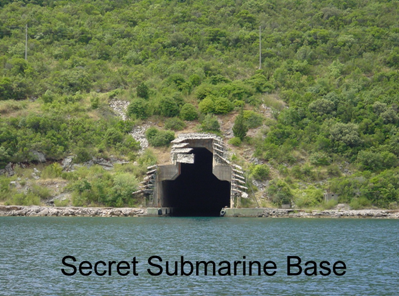
Totally protected and deep, I speculated this would be a very good area to have a naval base and wasn’t surprised to see secret submarine shelters bored into the mountainside (see photo and notice the camoflage on top). This area was top secret and totally off limits in the bad old commie days (remember the “No” principle) as evidenced by our old charts which are full of “Navigation Prohibited” and “Absolutely No Anchoring” signs. Oh, and my favorite at the entrance to the busy beach resort of Budva, with motorboats coming and going, jet skiers flying around, people swimming and even para-gliders being pulled by cigarette boats, “Mines are known to exist in this area” (!!).
We anchored in 13 meters, (42 25.415 N 18 45. 890 E), in absolutely fantastic holding as I had to use the engine to break the anchor out when we left and it came up with about 400 pounds of fine brown clay all over it. Also, this is most likely to be the furthest north we anchor on our Tehani-li adventures…. We are 2,160 miles north of where we started in Malaysia, which itself is about 7,000 miles away as the boat sails.
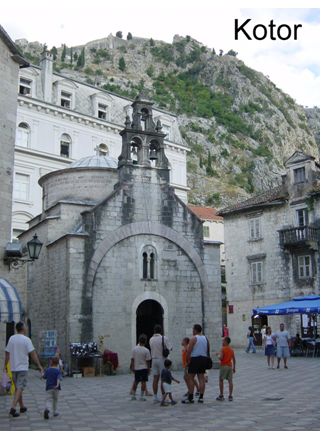
The ancient walled town of Kotor is a Unesco World Heritage Site and is as unknown and undiscovered as it is beautiful. With a 2000 year history there was plenty of time to build walls, and churches, museums and forts.
Kotor is small but not tiny and there is great pleasure to be had just wandering the ancient twisted cobblestone streets looking up at all the crooked, red-roofed buildings with wooden shutters open letting domestic sounds spill out onto the streets below. The walls extend way above the city all the way up the mountains behind.
There are about a million steps to climb to give you awesome views of the pristine and little changed mountain villages below. We climbed up about a third and took lots of photos. We all liked Kotor so much we decided to extend our stay there even though Greg and Miki were planning on getting back to Budva right away.
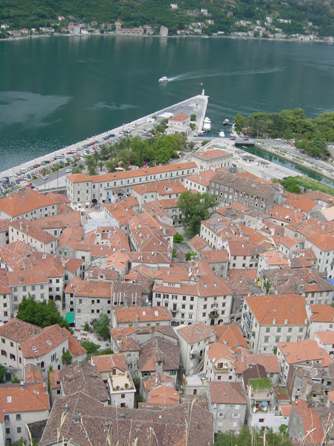
There were many restaurants in the countless hidden plazas and it looked like a smaller version of Dubrovnik (40 miles up the coast in Croatia and the jewel in the crown for that country) but without any tourists whatsoever. We basically had the place to ourselves. There were one or two yachts tied up to the key but we didn’t meet them and were the only boat at anchor. It was nice to finally have a place in Europe you could enjoy without having the rest of Europe right there enjoying it with you, around you and on top of you.
I won’t say the anchorage was perfect as there was loud techno music (oxymoron) blasting from cafes until 2 AM, such as there is everywhere else in the Med. One thing about the Europeans and their music, they like it loud and they like it bad. We turn on a couple of 12 volt fans in the V-berth where we sleep and they help drone out the incessant full volume mindless thumping of the untalented playing to the uneducated.
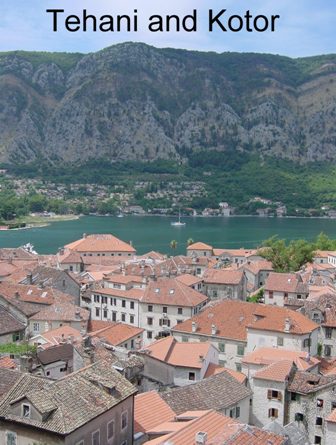
Then it was time to get Greg and Miki back and we “med-sailed” all the way back to Budva. Remember three days before how the wind was on the nose coming up the coast? Yep, it was on the nose coming all the way back too! I can see why it took Ulysses 20 something years to sail home in the Odyssey – he didn’t have an engine. When we returned to Budva we had an “open house” on the boat and invited the family to come down and visit. Dusan, Miki’s uncle and Krsto’s father, was especially interested in the boat having been a fisherman for many years. I gave him a bottle of scotch – the bottle that we won at quiz night in Salala, Oman – when he visited. He seemed to like that.
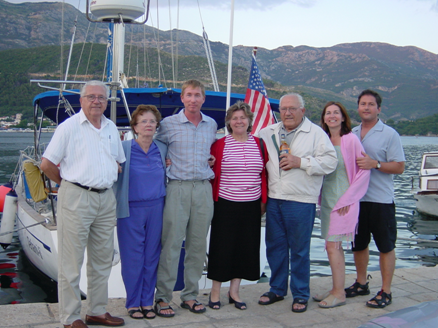
We provisioned in Budva and it was so very easy. A short walk behind “Jadran” is the supermarket. On one side is a bakery and on the other a fresh fruit and veggie market! Food is much cheaper here than the rest of Europe. The local cheese is mild and excellent. The same could also be said for the beer, “Nik Gold.” Weather wasn’t a big problem, though we did have several days of strong thunderstorms that seem to snuggle into the bay of Budva and sit.
The wind to watch out for comes barreling down the mountains from the north with no notice and is known as the “Bura.” The other wind to watch for comes from the south and builds over a few days giving you a slow and uncomfortable ride. It is called the “Yugo” – just like the car, which shares the same characteristics.

It was great catching up with Greg and Miki again as we hadn’t seen them since our wedding three years ago. We want to thank them and all the time they took out of their vacation to drive us around those suicidal mountain roads and plan things for us. (Editor’s note: observant readers may notice Miki appears in four of the above photos wearing the same green dress. It isn’t the same dress. She has many green dresses. They just look similar. Really.) We also, again, want to thank the whole Niklanovic clan for taking such good care of us, especially Vlado and Neva. Hvala! Hvala! Hvala!
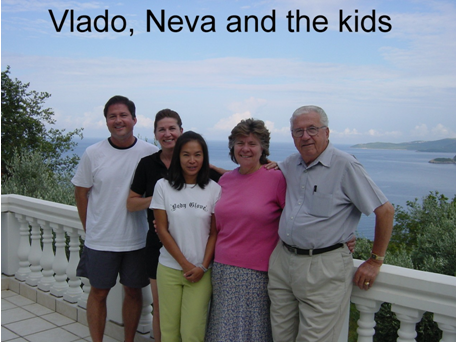
After their holiday in Montenegro, our two intrepid sailors “med-sailed” south 450 miles on a very rolly passage to Malta, the crossroads of the Mediterranean.

